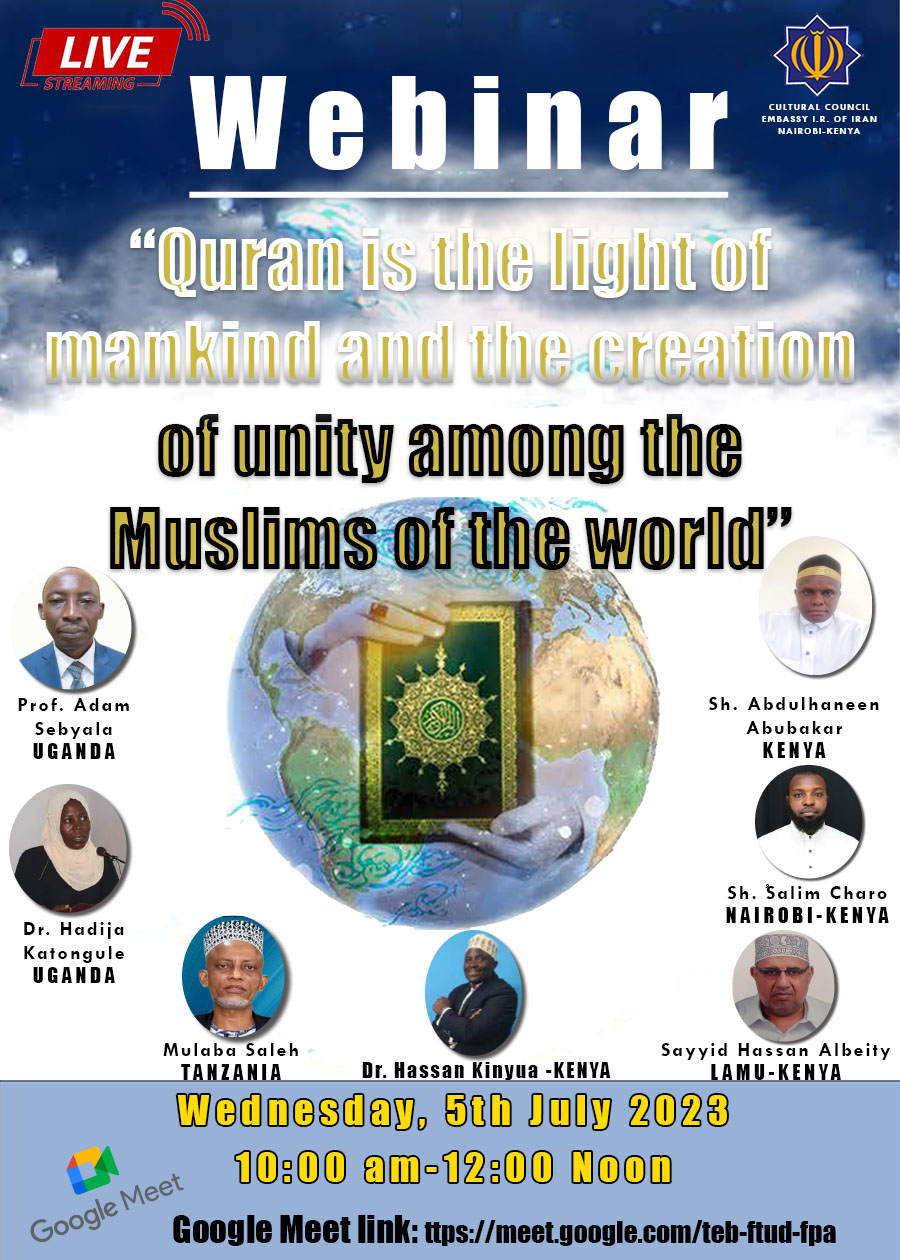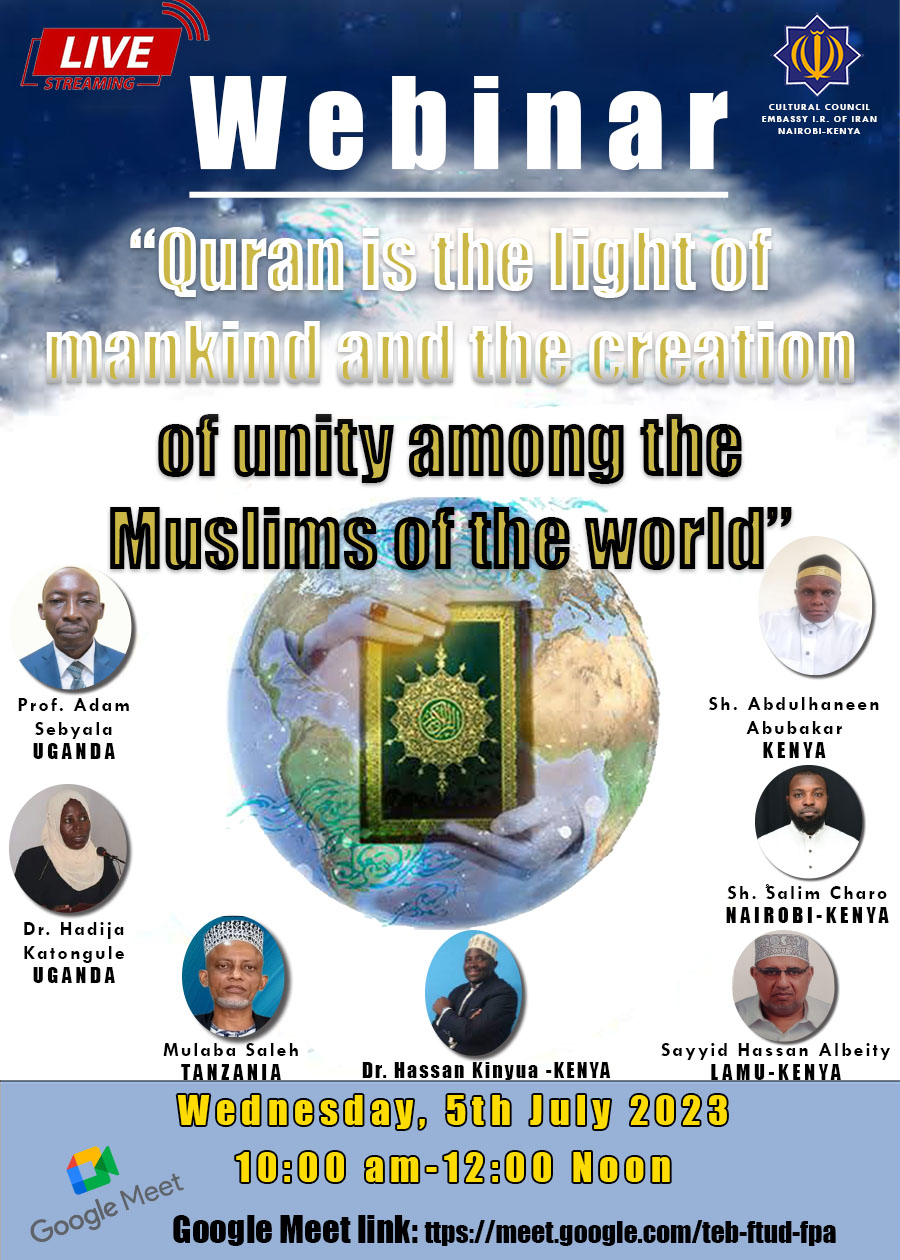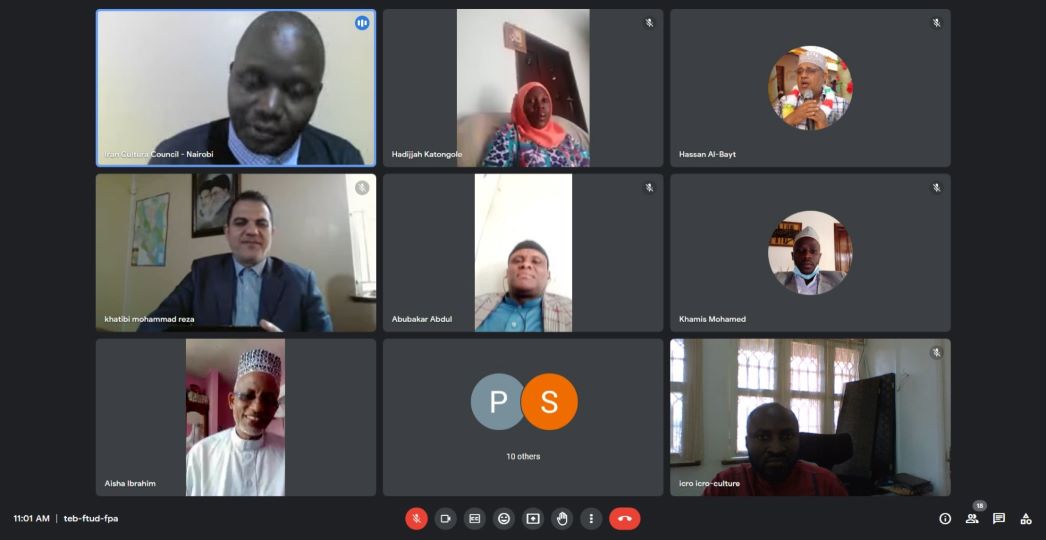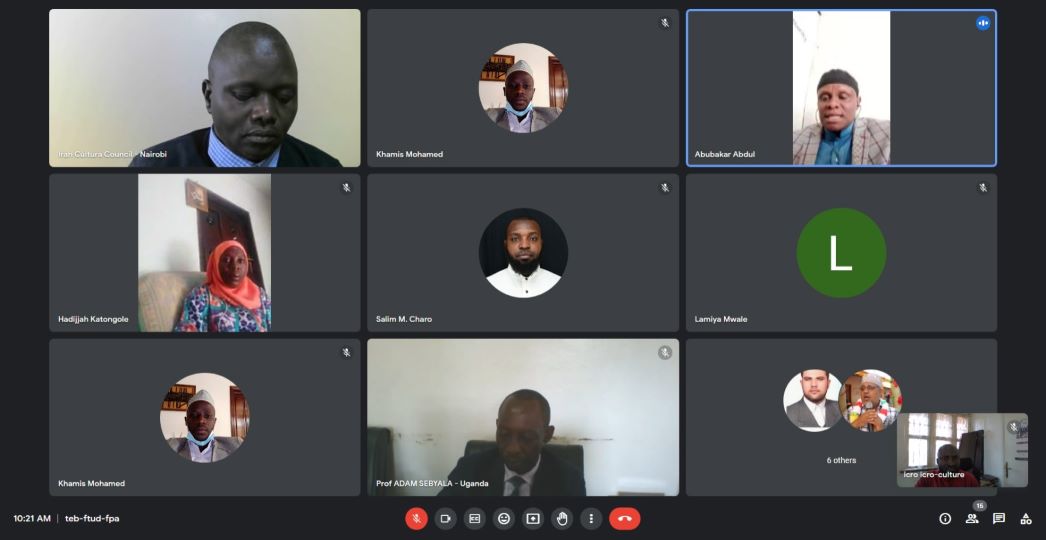Desecration of the Holy Quran
East Africa Webinar Conference on Desecration of the Holy Quran

East Africa Webinar Conference on Desecration of the Holy Quran on Wednesday 5th July 2023.
This seminar was organized by the Cultural Consulate of the Embassy of the Islamic Republic of Iran in Tanzania in cooperation with counterparts in Uganda and Kenya.
The introduction of seminar was made by Brother Salman Farsi from Iran Cultural Council of Kenya who said that the purpose of holding such an important event is to hold the culprits responsible for their actions and showcasing the role of the holy Quran in Unity, diversity, resiliency and solidarity.
TOPICS - Key Focus Areas:
1. Exploring the Universal Message of the Quran by Sheikh Abubakar Abdul from Kenya.
2. The Quran's Role in Personal and Spiritual Transformation by Sheikh Dr. Hassan Kinyua from Kenya Institute of Foreign Languages and Professional Studies (KIFLAPS).
3. Quran as the Light of Mankind.
4. Promoting Intra-Muslim Dialogue and Understanding by Sheikh Hassan Al-Bayt from Tanzania
5. The Quran's Influence on Social Justice and Equality by Sheikh Mulabba Swaliik from Tanzania.
6. Showcasing Unity in Diversity by Sheikh Salim Charo, Coordinator of National Leaders forum in Kenya.
7. Leveraging Technology for Quranic Education and Outreach.
8. The Quran's Role in Countering Extremism and Sectarianism by Prof. Adam Sebyala, a lecturer at Al-Mustafa Islamic College Uganda.
9. Promoting Religious Tolerance and Freedom of Worship Dr. Hadijjah Katongole, a lecturer from Kampala International University in Uganda.
- Exploring the Universal Message of the Quran by Sheikh Abubakar Abdul from Kenya
- The Holy Quran in Promoting religious equity and tolerance by Dr. Hadijjah Katongole, a lecturer from Kampala International University in Uganda condemned the Swedish act of burning the holy Quran.
She noted that there is no compulsion in religion and there is no any idea of intolerance. She noted that many Muslim religious leaders have always asked followers to be peaceful and mindful with other faith which the Islam teaches.
She said that insulting the Quran has no relation with freedom of expression as the Swedish people claimed. Burning of the holy Quran is inhumane and it cannot be taken for granted since it affects Muslim believers and peace-loving people.
Islam recognizes other faith as the Quran depends on it and nobody can be forced to worship what is not in his/her will.
She rallied other faith to use religious dialogue and
- Sheikh Mulabba Swaliik from Tanzania on the Quran's Influence on Social Justice and Equality.
He noted that there are many pillars of establishing social justice and equality which include;
Oneness of God (Tawheed); He noted that all messengers of God came to teach mankind this pillar
Immamate (Leadership): This pillar is equally important in achieving social justice and equity because some leaders are only establishing rulership to gain their selfish interests such as the increasing greedy in government institutions, corruption at all levels among others.
He appreciated the Islamic governance system (Wilaayat Faqih) in the Islamic Republic of Iran which is one of the best models of governance in the world.
- Promoting Intra-Muslim Dialogue and Understanding by Seyyed Hassan Al-Bayt from Tanzania
He noted that Islam encourages religious dialogue where we have to use wisdom and knowledge in sharing ideas and concerns as we attach respect for each other.
He thanked almighty God for having peaceful Muslims in East Africa who don’t fight over small issues because of intersect differences.
He noted that we should hold on the rope of almighty God in order not to divide among ourselves but unite against mischief.
He advised scholars and academicians to start teaching comparative topics so that we learn from each other sects and faith to avoid misinformation and hateful speech.
- The Quran's Role in Countering Extremism and Sectarianism by Prof. Adam Sebyala, a lecturer at Al-Mustafa Islamic College Uganda.
He thanked organizers for coming up with academic discussion where scholars add up their voices and make clarifications on issues at hand.
He quoted the holy Quran where Islam takes the middle ground for affirmative actions.
He noted that Europeans have the antisemitism law which protect the Israeli jews against holocaust but there is no law to protect Muslims in the West.
He quoted Goldstone who said that so long as the holy Quran is in the hands of the Muslims then nobody will control then but he didn’t say to destroy it materially but he asked them to change the translated meanings.
He rallied Muslims not to attack anyone but use such platforms to airout their voices to abusive people to take heed and be responsible since Islam calls for moderation.
He said that it is not allowed to burn the Holy Quran in the disguise of freedom of expression against the 2bn Muslim population in the whole world.
He noted that Islamic empire army was under commander Usama who was a son of an ex-slave and this continued for a long time where slaves served great empires until of recent.
This is the respect and stature of other religions in Islam, yet frequent Islamophobic incidents prevail and are often swept under the rug in the guise of freedom of expression,” he added.
- Showcasing Unity in Diversity by Sheikh Salim Charo, the coordinator of National Leaders forum in Kenya.
He also added his voice to condemn the burning of the Holy Quran in Sweden. He called on Muslims to unite as it is diversity without fragmentation as it is seen in some countries.
He noted that God made us from Adam and Hawah so that we appreciate and know ourselves more but not to divide each other.
He said that terrorism is being targeted by certain selfish people who gain from divide and rule mentality that Muslims have accepted to be manipulated and used.
He said that if Allah wanted, he would have made us of the same community, colour, race and tribe but he wanted this unity in diversity
- The Quran's Role in Personal and Spiritual Transformation by Sheikh Dr. Hassan Kinyua from Kenya Institute of Foreign Languages and Professional Studies (KIFLAPS).
He noted that by examining the influential power of the holy Quran, it impacts the social transformation of humankind in all aspects of life such as self-discipline and self-respect.
The role of the Holy Quran cannot be suffocated by the selfish actions of some people like what happened in Sweden recently.
- Exploring the Universal Message of the Quran by Mr. Enock Tarus from Kenya
He noted that Islam is a religion that holds that peace is the summum bonum or the highest goal of man’s life and that a total surrender to the will of God is the only means of attaining that goal. Until recently, some non-Muslim scholars used the term “Muhammadanism” instead of “Islam.
The cardinal principle of Islam is a belief in the absolute unity of God. In the very opening sura or chapter of the Qur’an, God has been described as al-Rahman (the Most Merciful), al-Rahim (the Most Gracious), Rabb al-alamin (the Lord of the people). It may be mentioned here that the Hebrew Bible or the Old Testament refers to God as the God of Abraham, Isaac and Jacob. But the Qur’an nowhere refers to God as the God of any particular prophet. In fact, God is one and the only Creator of everything in the universe.
He said that God is the Creator of the universe and He sends guidance to all humanity. That is why the Muslims are commanded by the Qur’an to affirm the divine messages given to all the previous Prophets. Muslims, as an indispensable part of their faith (Iman), are bound to affirm that they believe in God and in His angels, in His sacred Books and in His messengers, in the Day of Judgment and in the apportionment of good and evil from Him on the day of resurrection:
The messenger believes in what has been sent down to him from his Lord, as do the faithful. They all believe in God, His angels, His scriptures, and His messengers. We make no distinction between any of His messengers. (2:285)
Islam can claim a glorious uniqueness on the issue of religious freedom. But unfortunately, Islam has been misunderstood by its critics and many of its adherents as well. There is a gulf of difference between the teachings of Islam and the dealings of some Muslims in this sensitive area. The Qur’an categorically states that there is no coercion in matters of faith: “There is no compulsion in religion.” (2:256) This verse, like many other verses in the Qur’an, guarantees freedom of religion and worship.
Mr. Khatibi Mohammad Reza appreciated participants for sharing their insights in the East African webinar on desecration of the Holy Quran.
Recommendations:
- Continue seeking for Islamic knowledge
- Continue engaging in interfaith dialogues
- Standing against evil at all times.




Write your comment.